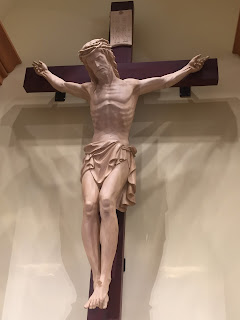Cardinal Burke once again made headlines recently.
Having nothing but respect and admiration for the most holy red-hatted cardinal
I was shocked to find that I yet again completely and utterly disagreed with
him. This should, of course, come as no real shock as it happens every time the man
makes headlines. Ok, maybe stating I have nothing but respect and admiration was a bit of
an overstatement. That or just a bold-faced lie.
While I could claim I dutifully took note of what the Cardinal had
to say the reality, is I saved many articles covering what he had said to read
later. Ultimately, however, I moved on with my day and my life with little more
than an eye roll saying great Burke’s at it again. That is until today.
Today at mass we once again sang for the opening hymn
All Are Welcome. A song I’ve heard dozens of times. A song that elicited from
the priest a joke about all being welcomed including me. I and the rest in
attendance laughed. Perhaps one or two had the passing thought if only Ingram
(as the priest referred to me) weren’t welcome.
As we sang this opening hymn, I was left to wonder, we
sing this, we say this, but do we [we being the Church (the Church being the
Catholic flavor)], actually believe it to the point of making it a reality?
This is where Cardinal Burke came to mind. As we sang
the second verse to the song I began to think of the idea what if the song was
re-written, specifically by someone musically inclined and with a slight ax to
grind with the Church (I fortunately or unfortunately am only one of those, but have a friend who is both All Are Welcome Re-Written Listen Here).
I thought of the following: all are welcome except… all
are welcome unless… all are welcome but…
The welcome expressed in this hymn and the welcome
born out of the life and teaching of Jesus is unconditional. Yet far too often
the welcome of the Church is very conditional…
All are welcome unless you can’t donate enough per
year. All are welcome except those who identify as part of the LGBTQ+
community. All are welcome unless you are divorced and remarried (as Burke
would claim). All are welcome but first, you must xyz.
While I understand that the Church as an institution
needs guidelines, needs standards, needs accountability, I just wish the Church
were better at holding herself accountable. I really wish the Church were
better at recognizing how often the Church falls short of the standards the
Church has set. Not only the standards
set by Jesus but the standards set by the institution itself.
I’m tired of the Church pretending to be welcoming.
Jesus’ welcome was not conditional. Why is ours?









